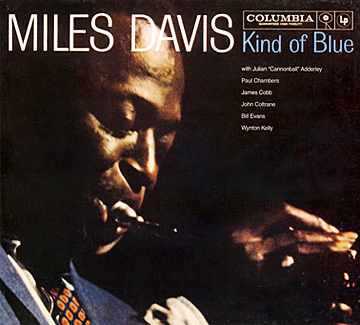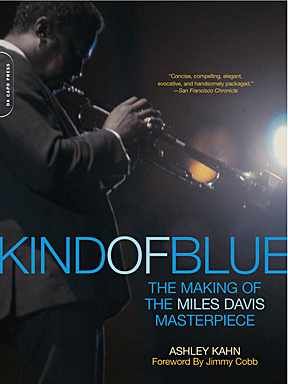 Ashley Kahn said he was 14 or 15 when he put the Miles Davis’ album Kind of Blue on the turntable and dropped the needle on the vintage vinyl for the first time in the mid-1970s.
Ashley Kahn said he was 14 or 15 when he put the Miles Davis’ album Kind of Blue on the turntable and dropped the needle on the vintage vinyl for the first time in the mid-1970s.
“I was very much into the sounds that were in the air at the time, like Bruce Springsteen was just starting to happen. By ’77, I was deep in Bob Marley, the Talking Heads had just broken. Those were all my heroes. And the guy who actually turned me on to a bunch of those different groups was a high school buddy,” the journalist recalled.
“He was over at my place, and he went up to my father’s collection, which was just about 20 albums, and … pulled Kind of Blue and he said, ‘You know, this is a classic.’ And it took the blinders off my eyes and ears, and I put it on and it certainly didn’t sound like any sound that I was defining as jazz at that point.”
Millions have experienced that musical awakening upon hearing the 1959 masterpiece.
“The depth of the emotion is really what struck me. It wasn’t sad; it certainly wasn’t happy; it was very mood-setting and deep. You don’t forget your first interaction with a classic, and that’s exactly what that album is,” Kahn said during a call from his home in Fort Lee, N.J.In 1999, the music producer penned an article for The New York Times to celebrate the 40th anniversary of the iconic record. A publisher asked Kahn if could expand that into a book.
Kind of Blue: The Making of the Miles Davis Masterpiece was released in 2001.
“I had known that the album was enduringly popular. I had no idea that it was still selling 5,000 copies and still till this day sells more than contemporary jazz,” he said. “And 50 years on, it’s a cultural milestone and one of those classics that transcends its time. It feels always modern. The music, when you put it on, it sounds as fresh as yesterday.”
The noted music historian and author will discuss Kind of Blue Wednesday, Nov. 14, at 7 p.m. in the Center for Performing Arts Recital Hall.
His free, public talk is part of UT’s First Look+Listen, a partnership between the First-Year Experience Program and Student Affairs. All freshmen were asked to listen to Kind of Blue, and reading groups and events are bringing students and faculty together to consider the work’s continuing relevance.
 “We wanted to try something new and expand the program from books to music and use the landmark jazz album Kind of Blue that maybe not all students are familiar with, but that in its own way tells the history of American music — born of European and African music traditions — by one of the most influential musicians of the 20th century, Miles Davis,” said Jennifer Rockwood, director of the First-Year Experience Program.
“We wanted to try something new and expand the program from books to music and use the landmark jazz album Kind of Blue that maybe not all students are familiar with, but that in its own way tells the history of American music — born of European and African music traditions — by one of the most influential musicians of the 20th century, Miles Davis,” said Jennifer Rockwood, director of the First-Year Experience Program.
The album that runs just over 45 minutes has long-lasting playing power, influencing jazz, rock and classical music. In 2003, the LP was ranked No. 12 on Rolling Stone’s list of the 500 greatest albums of all time.
Quintessentially cool, Davis was the trumpet-playing maestro that made it happen.
“His appeal, the way he looked, the way he sounded, that trumpet, that eerie sound — that lonely, vulnerable sound of his trumpet is such an amazing singular sound in modern jazz and became popular around the world,” Kahn said.
And his ensemble featured John Coltrane on tenor saxophone, Cannonball Adderley on alto sax, Bill Evans on piano, Paul Chambers on bass, and Jimmy Cobb on drums.
“His band was pretty much all the pioneers of modern jazz,” Kahn said. “Q-Tip, the hip-hop producer and rapper, his way of describing [the group] is the Justice League of Jazz.”
Kahn, a regular commentator on NPR’s “Morning Edition,” said his 90-minute multimedia presentation will offer a way to understand a great cultural work.
“If you’re into hip-hop, if you’re into rock, if you’re into classical music, if you’re into other forms of cultural expression such as painting or theater, this way of looking at one piece of work can be applied to anything,” he said. “It’s not just the subject itself, it’s the way of talking about it, the way of examining it, the way of celebrating it.
“That passion for a great, creative artistic statement is the one thing that I hope everybody will walk away with and be able to apply to whatever it is that is their favorite album or book or play.”